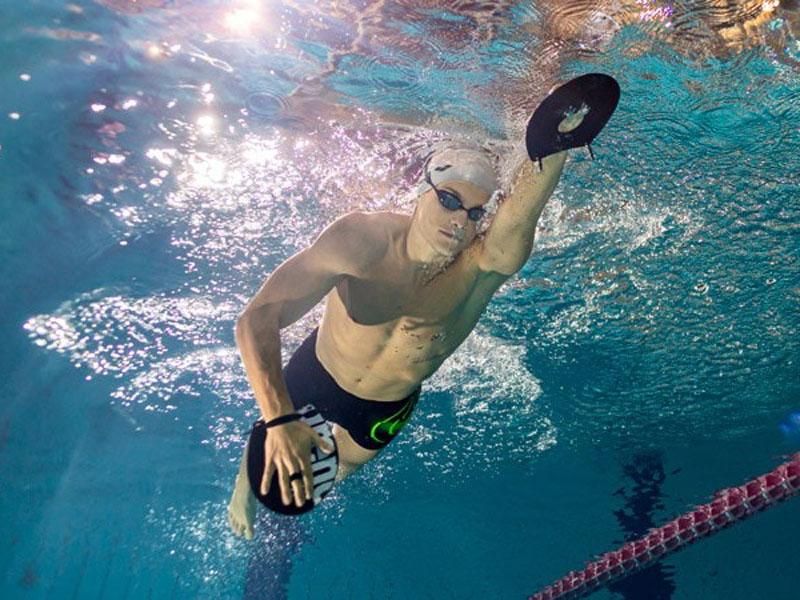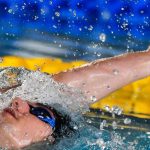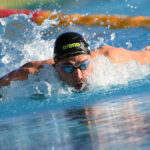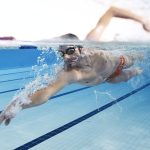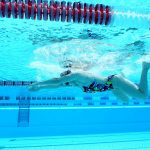Start Serious Training With Swimming Hand Paddles
Extremely popular with both coaches and swimmers, hand paddles are a swimming accessory that belong in the bag of any swimmer looking to improve their training regime. Swimming hand paddles build upper body strength and make it easier to propel your arms in the water. But what other advantages do they offer to your swim training and what kind are available?
The Advantages of Swimming Hand Paddles
Many excellent training aids accentuate your swim training, and swimming hand paddles are no exception. Better known as hand paddles, these training tools use resistance to strengthen your upper body and improve your swimming technique.
Resistance Is Strength
In the world of bodybuilding, it’s all about the gains. Muscles are grown by increasing resistance in order to break down muscle fibers. These muscles can then grow stronger with a good diet and plenty of rest.
The same concept applies to water sports. Like swimming fins for your feet, swimming hand paddles add water-resistance to your stroke for strength training. This added resistance is just like the difference in doing a bicep curl with a heavier weight than you used before.
Using the hand paddles strengthens the muscles in your arms, shoulders, back, and chest to make you a stronger swimmer.
Improved Catch and Pull
One of the most technical parts of the freestyle stroke is the freestyle catch. When using finger paddles, a poor freestyle hand entry is accentuated if your elbow positioning is off. This is because you will feel water resistance hitting on the wrong side of your hand more so than you would if you were swimming without using swim paddles.
On the other hand, a successful stroke is exaggerated when you achieve a good freestyle pull with training paddles. Any freestyler will become more attuned to when their freestyle pull is effective as the results will be much clearer thanks to an increase in water resistance. Imagine swimming with webbed fingers, this is as close as it gets.
Fast Is Fun!
The writing is on the wall about the positive effect that swimming hand paddles can have on your stroke technique and upper body strength. However, it’s also worth mentioning that using hand paddles is quite simply fun. If you combine swimming hand paddles with swim fins (flippers), you are an unstoppable force in the pool and the speed increase will leave your head swimming as well as your body.
Understand How to Use Swim Paddles
While they are really beneficial for experienced swimmers, swimming hand paddles must be used with care and moderation by beginners. They are serious training tools, and if you add them to your swimming training, we recommend you heed the following advice.
Protect Your Swimming Stroke
We all want to improve our freestyle, but using hand paddles the wrong way or for too long could actually be detrimental to your swimming stroke. The greatest difficulty is maintaining your arm stroke and body position in the water. If your arm stroke is not in line, you will not swim efficiently and will make an “S” shape in the water as you attempt to control the hand paddles properly.
To avoid this, start with some very simple drills:
Before beginning, make sure you put on a pair of swim fins to help you float. Then put on your hand paddles and try the “zip-up freestyle” technique. With your arms extended out in front of you, start swimming with just one arm, paying careful attention to the pull and thrust phase. At this point, when your arm is completely extended along your side, focus on your recovery, making sure your elbow is high and “zipping” your arm closed in front of you.
Perform this drill alternating 25m freestyle using only your left arm followed by 25m using only your right arm. Once you feel comfortable with the drill, you can try swimming without fins or increasing the distance.
Gain Strength Instead of Injuries
The overuse of swim training paddles can cause shoulder problems. Hand paddles place your shoulder and upper/lower back muscles under excessive strain. In the long run, extended usage can cause serious problems.
To lessen the load on your upper body, try making these adjustments:
- Use a pullbuoy to keep your body in a straight line so that the muscles in your upper body can work more efficiently. Pullbuoys help keep your hips higher in the water, making your swim stroke easier and reducing the water-resistance normally caused by a loss of efficiency in your lower body.
- Include the following in your warm-up: 10×50 m freestyle with a pullbuoy and hand paddles with 20 seconds recovery time. Swim for 25 m while focusing on technique then 25 m focusing on hypoxia breathing every three to five strokes.
- Alternate swimming with and without paddles. Depending on your level, your sessions with paddles will vary in length. Swimming is a full-body workout, and having well-balanced upper and lower body muscles is essential. Focusing only on your arm stroke using paddles could actually be counter-productive. To find the right balance, try some “combo” drills:
- 6 x 100 m freestyle with 20 seconds recovery swimming
- 1 x 50 m pullbuoy + hand paddles
- 1 x 50 m complete stroke
- 1 x 50 m pullbuoy + arm paddles
- 1 x 50 m legs with pullbuoy out in front
Remember no training drill will turn you into a better swimmer unless it is performed correctly. Learn to use the proper technique and combine arm and leg work correctly to make your training more varied and effective.
What’s Out There? The Types of Paddles to Choose From
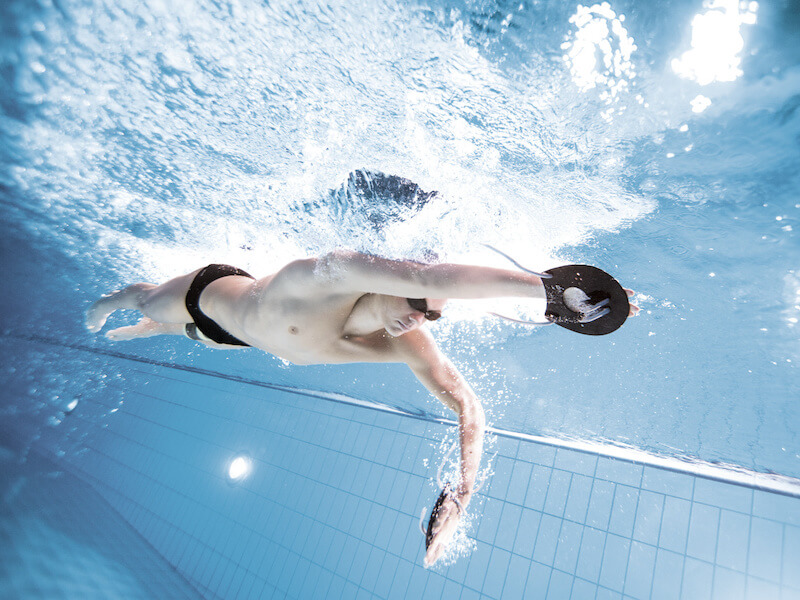
The various designs of swimming hand paddles help you work on different aspects of your stroke and form. There’s also something to suit the needs and abilities of any swimmer at arena.
Flex Paddles
These power paddles are made with a silicone mix for flexibility. The Flex Paddles add a little resistance to your stroke, which is ideal for building strength and perfecting the nuances of your stroke. Their ergonomic shape is designed to put less strain on your shoulders, minimizing the chance of shoulder injuries. And the mesh material allows water to pass through the paddles, giving you a more natural-feeling training experience, including at the hand entry.
Vortex Evolution Hand Paddle
These hand paddles are designed to meet the needs of experienced swimmers and fit the palm of your hand. Multiple finger loops with adjustable straps ensure a comfortable fit, which prevents any unwanted rubbing on the wrists. The slightly curved design of the Vortex Evolution Hand Paddle allows for a perfect catch and will make you feel as though you were swimming bare-handed.
Elite Paddles
The Elite Hand Paddle has an adjustable wrist strap and a large hole in its center to get a more natural feel of the water. They feature a smoother edge that could protect you and your fellow swimmers.
The Elite Finger Paddle is a smaller version of the aforementioned which utilizes the top part of your hand. This paddle is unique in that it allows you to safely improve your catch phase in all of the four swimming strokes.
Training Sessions Need Swimming Hand Paddles
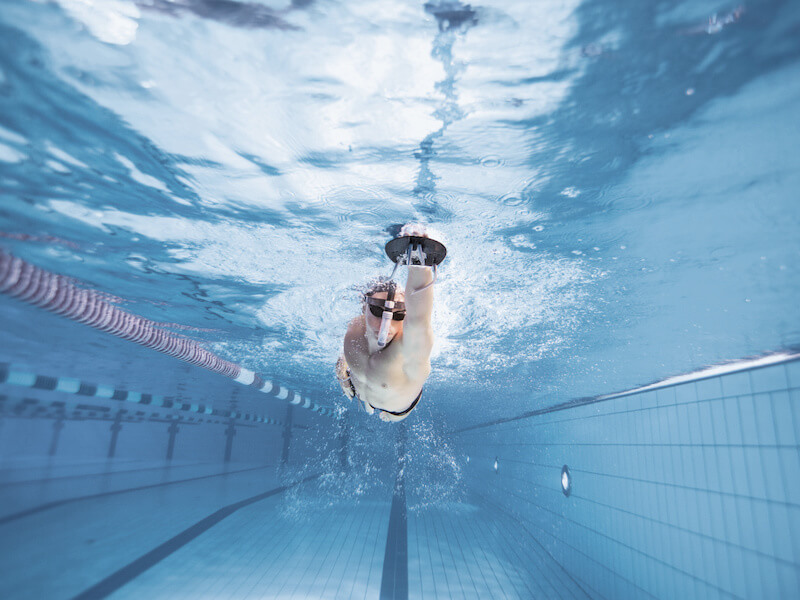
Adding resistance to your workout is a no-brainer. With surprising strength results and loads of fun to be had, there’s a lot of good to be said about adding swimming hand paddles to your swim gear. As long as you are careful and use them the right way, swim paddles will no doubt be a great addition to your usual workouts.
In addition to arena’s line of swimwear and accessories like ear plugs, take a look at our range of arena swimming hand paddles, which cater to all swimmers — from triathlon competitors to those just starting out.
